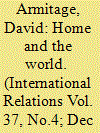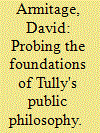| Srl | Item |
| 1 |
ID:
193227


|
|
|
|
|
| Summary/Abstract |
The Finnish lawyer-historian Martti Koskenniemi’s new book, To the Uttermost Parts of the Earth: Legal Imagination and International Power, 1300–1870 (2021), is the culmination of a 30-year-long project to deconstruct and historicise the reigning assumptions of the profession of international law. This article evaluates To the Uttermost Parts of the Earth in the context of Koskenniemi’s larger critical project as well as within the historiography of international law from the late 19th century to the present. It argues that Koskenniemi’s genealogical method is revealing and frustrating in equal measure: frustrating in its diffuseness and lack of overarching argument but revealing in its scope, in its erudition and in its ambitions to disrupt traditional teleologies, to reveal the constraining force of legal language and to expose European dialogues between ‘domestic’ and international law over more than 500 years.
|
|
|
|
|
|
|
|
|
|
|
|
|
|
|
|
| 2 |
ID:
101847


|
|
|
|
|
| Publication |
2011.
|
| Summary/Abstract |
James Tully's Public Philosophy in a New Key is a complex intellectual edifice. Tully deftly deploys the philosophical tools forged by, among others,
Wittgenstein, Arendt, Foucault, and Skinner to dismantle the architecture of
modern political reason in order to build in its place a more robust structure
adequate to the needs of a "de-imperialising age."
1
The resources he uses are
unusually diverse, ranging across the whole canon of Western political
thought, via historical methodology and critical philosophy, to the works of
contemporary public activists. The result, to paraphrase one philosopher who
is definitely not part of his synthesis, is a building for dwelling, and a dwelling for thinking
|
|
|
|
|
|
|
|
|
|
|
|
|
|
|
|